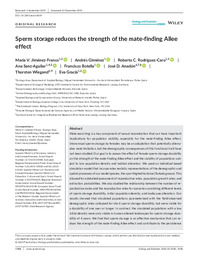Título :
Sperm storage reduces the strength of the mate-finding Allee effect |
Autor :
Jiménez Franco, María Victoria 
Giménez Casalduero, Andrés
Rodríguez-Caro, Roberto
Sanz-Aguilar, Ana
Botella Robles, Francisco 
Anadon, Jose Daniel 
Wiegand, Thorsten 
Graciá, Eva  |
Editor :
Wiley |
Departamento:
Departamentos de la UMH::Biología Aplicada |
Fecha de publicación:
2020-02-07 |
URI :
https://hdl.handle.net/11000/34892 |
Resumen :
Mate searching is a key component of sexual reproduction that can have important implications for population viability, especially for the mate-finding Allee effect. Interannual sperm storage by females may be an adaptation that potentially attenuates mate limitation, but the demographic consequences of this functional trait have not been studied. Our goal is to assess the effect of female sperm storage durability on the strength of the mate-finding Allee effect and the viability of populations subject to low population density and habitat alteration. We used an individual-based simulation model that incorporates realistic representations of the demographic and spatial processes of our model species, the spur-thighed tortoise (Testudo graeca). This allowed for a detailed assessment of reproductive rates, population growth rates, and extinction probabilities. We also studied the relationship between the number of reproductive males and the reproductive rates for scenarios combining different levels of sperm storage durability, initial population density, and landscape alteration. Our results showed that simulated populations parameterized with the field-observed demographic rates collapsed for short sperm storage durability, but were viable for a durability of one year or longer. In contrast, the simulated populations with a low initial density were only viable in human-altered landscapes for sperm storage durability of 4 years. We find that sperm storage is an effective mechanism that can reduce the strength of the mate-finding Allee effect and contribute to the persistence of low-density populations. Our study highlights the key role of sperm storage in the dynamics of species with limited movement ability to facilitate reproduction in patchy landscapes or during population expansion. This study represents the first quantification of the effect of sperm storage durability on population dynamics in different landscapes and population scenarios
|
Palabras clave/Materias:
Human-altered landscape
Individual-based modeling
Limited movement ability
Low-density population
Population extinction
Population growth rate
Reproductive rate
Testudo graeca |
Tipo de documento :
info:eu-repo/semantics/article |
Derechos de acceso:
info:eu-repo/semantics/openAccess
Attribution-NonCommercial-NoDerivatives 4.0 Internacional |
DOI :
https://doi.org/10.1002/ece3.6019 |
Publicado en:
Ecology and Evolution. Volume10, Issue4 February 2020. Pages 1938-1948 |
Aparece en las colecciones:
Artículos - Biología Aplicada
|

 La licencia se describe como: Atribución-NonComercial-NoDerivada 4.0 Internacional.
La licencia se describe como: Atribución-NonComercial-NoDerivada 4.0 Internacional.
.png)